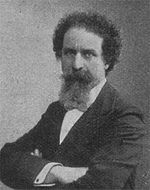Enrico Ferri
| Enrico Ferri | |
|---|---|
 |
|
| Born |
25 February 1856 San Benedetto Po, Lombardy–Venetia |
| Died | 12 April 1929 (aged 73) Rome, Kingdom of Italy |
| Academic advisors | Cesare Lombroso |
Enrico Ferri (25 February 1856 – 12 April 1929) was an Italian criminologist, socialist and student of Cesare Lombroso, the founder of the Italian school of criminology. While Lombroso researched the purported physiological factors that motivated criminals, Ferri investigated social and economic aspects. He served as editor of the socialist daily Avanti! and, in 1884, saw his book Criminal Sociology published. Later, his work served as the basis for Argentina’s penal code of 1921. Although at first he rejected the Italian dictator Benito Mussolini, Ferri later became one of Mussolini and his National Fascist Party's main external supporters.
Ferri was born in Lombardy in 1856, and worked first as a lecturer and later as a professor of Criminal law, having spent time as a student of Cesare Lombroso. While Lombroso researched anthropological criminology, Ferri focused more on social and economic influences on the criminal and crime rates.
Ferri's research led to him postulating theories calling for crime prevention methods to be the mainstay of law enforcement, as opposed to punishment of criminals after their crimes had taken place. He became a founder of the positivist school, and he researched psychological and social positivism as opposed to the biological positivism of Lombroso.
Ferri, at the time a radical, was elected to Italian Parliament in 1886. In 1893, he joined the Italian Socialist Party and edited their daily newspaper, the Avanti. In 1900 and 1904 he spoke out in congress against the roles of socialist ministers in bourgeoisie governments.
...
Wikipedia
